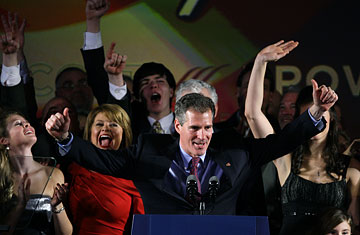
Massachusetts state senator Scott Brown celebrates in Boston on Jan. 19, 2010, after winning a special election to fill the U.S. Senate seat left vacant by the death of Ted Kennedy
A little-known Republican state senator on Tuesday night pulled off one of the most stunning upsets in modern political history, potentially dealing a crippling blow to President Obama's agenda. As Scott Brown claimed victory in his bid to become the first GOP Senator to represent Massachusetts in nearly four decades, he told his ecstatic supporters that they had sent a message that is likely to shake Democrats across the nation at the onset of the congressional midterm election season. "What happened here can happen all over America," Brown declared. The Democrats, he predicted, "will be challenged again and again across this country. When there's trouble in Massachusetts, there's trouble everywhere — and now they know it."
Brown campaigned against his opponent, state attorney general Martha Coakley, on a promise to be the "41st Senator" — the one whose vote would give the Republicans the power to block Obama's health care bill with a filibuster. And yet, the ironies were deep. Brown won in a special election to fill an opening created by the death in August of Edward Kennedy, who had often described universal health coverage as "the cause of my life." And his victory came at the hands of voters whose state has come closer than any other to achieving that goal, thanks to a 2006 law that was championed by Republican Governor Mitt Romney.
Brown's victory has put a possibly insurmountable obstacle before a health care bill that only days ago was looking all but inevitable, after versions of it had passed both the House and the Senate. At this point, Democratic strategists in Washington say, the only hope may be to persuade a reluctant House to pass the Senate version intact. But the shock waves rippling from Massachusetts have made that a questionable prospect. Even if House liberals can be persuaded to accept the Senate bill's more conservative provisions, the larger concern is that Brown's victory could set off a stampede of moderate and conservative Democrats away from the legislation.
Democratic officials in Washington blamed the defeat on the deficiencies of Coakley, who as recently as November enjoyed a 30-point lead; her campaign claimed she had been pulled under by a sour national mood and general disenchantment with Washington. The recriminations began even before the Massachusetts polls closed. White House press secretary Robert Gibbs said Obama — who had traveled to Massachusetts in the final weekend of the race in an effort to rescue Coakley — had been "surprised and frustrated" by the turn the race had taken. And David Axelrod, the President's chief political strategist, told the Baltimore Sun, "The White House did everything we were asked to do. I think if we had been asked earlier, we would have responded earlier." But the Coakley campaign, in a memo leaked to Politico.com, blamed "the failure of national Democrats to support Coakley," saying the national party had ignored the campaign's warning that a political catastrophe was on the way.
Brown ended up winning with a solid 5-point margin, riding a late surge of support. Though he ran a largely upbeat campaign, the mood of the electorate was angry — as evidenced by extraordinarily heavy turnout for a special election. At times, his campaign sounded like an echo of the very themes that carried Obama to victory a little over a year ago. Brown had run against "business as usual" in Washington, and his supporters on Tuesday night chanted, "Yes we can." In case the point still wasn't clear, one of his supporters held a hand-lettered sign: "It's Our Turn for a Change."
